The sun had not begun to peek over the horizon in south Las Cruces when a pair of siblings headed to work at a flower farm to prepare soil for planting and pack plants for shipping.
That Monday, Jan. 27, was like any other work day: Pedro, 18, and his sister Elizabeth, 19, rode in a truck with other relatives, talking about what work awaited them, how much closer they were to buying a second used car and what they might have for dinner.
That Monday also was a week after Donald Trump’s inauguration as president. The truck carrying the siblings – migrants from Honduras who arrived in El Paso in early 2021 as unaccompanied minors – was pulled over just a few minutes from the farm by an unmarked vehicle flashing police lights.
Their ordinary day turned to chaos by the time the sun fully rose that morning.
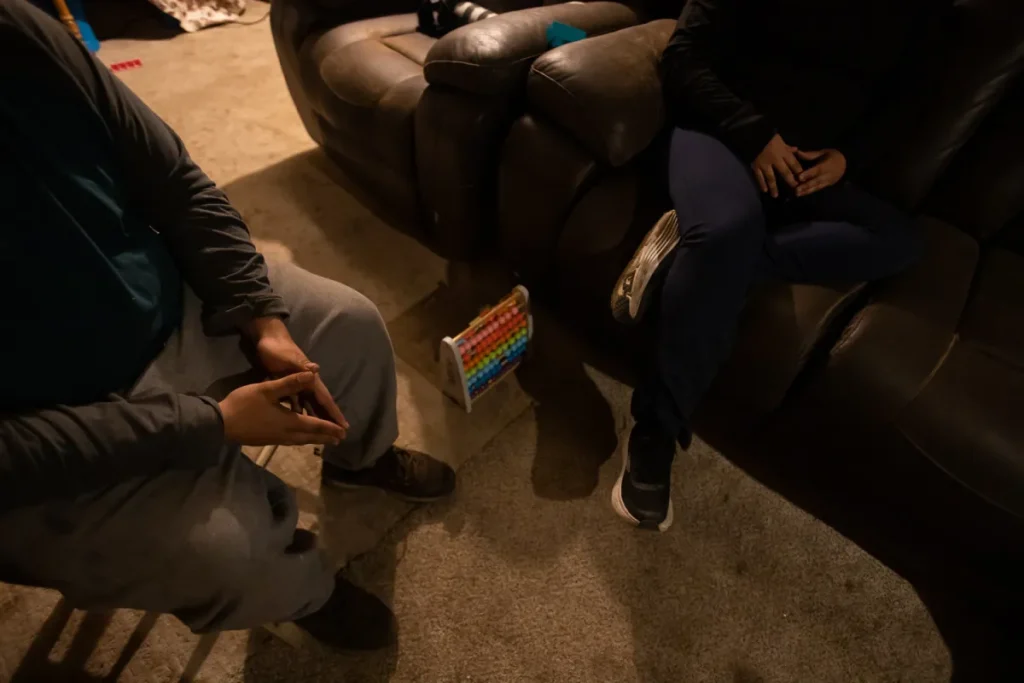
Pedro said a plainclothes officer, who identified himself as a U.S. Immigration and Customs Enforcement agent, asked him his name. He responded, and the agent told him there was a warrant for his arrest, pulled him out of the car and handcuffed him. No other questions were asked, Pedro said. The family was surrounded by at least five agents.
Elizabeth exited the vehicle crying, asking what was happening, and also was arrested.
Two others in the truck were arrested, but El Paso Matters was unable to determine their status; a fifth person was not detained.
Pedro and Elizabeth – they asked that their real names not be used to protect their privacy – have pending asylum applications. They are authorized to be in the country while they await their hearing, and have the legal right to work here.Neither has a criminal record – they were never charged with illegal entry. ICE agents have not produced a warrant or stated why the family was pulled over.
Still, the siblings were detained for two weeks before being released.
Human rights advocates have questions about the legality of their detention. They also say the teens’ detention shows that immigration enforcement actions under President Trump may be indiscriminately widespread and not targeted toward those with criminal records, as the administration claims.
“This was pretty egregious,” said Jacob Wedemeyer, the attorney representing the siblings through Estrella del Paso, a Catholic legal services ministry for migrants. “We don’t know that they had reasonable suspicion or probable cause to stop their vehicle.”
ICE officials didn’t respond to El Paso Matters’ repeated requests for comment or information on the siblings’ arrest. On Jan. 28, eight days after Trump’s inauguration and a day after the siblings were detained, White House Press Secretary Karoline Leavitt said during a media briefing that the new administration regards all undocumented immigrants as criminals.
Being in the United States without proper documentation is a civil violation under immigration law, not a criminal offense, unless a person was previously deported and reentered the country without permission,according to the Migration Policy Institute.
‘Treated us like criminals’
Sitting on the porch of their humble Las Cruces home Wednesday evening, Pedro and Elizabeth refuted being labeled as criminals. But they said they were treated as such.
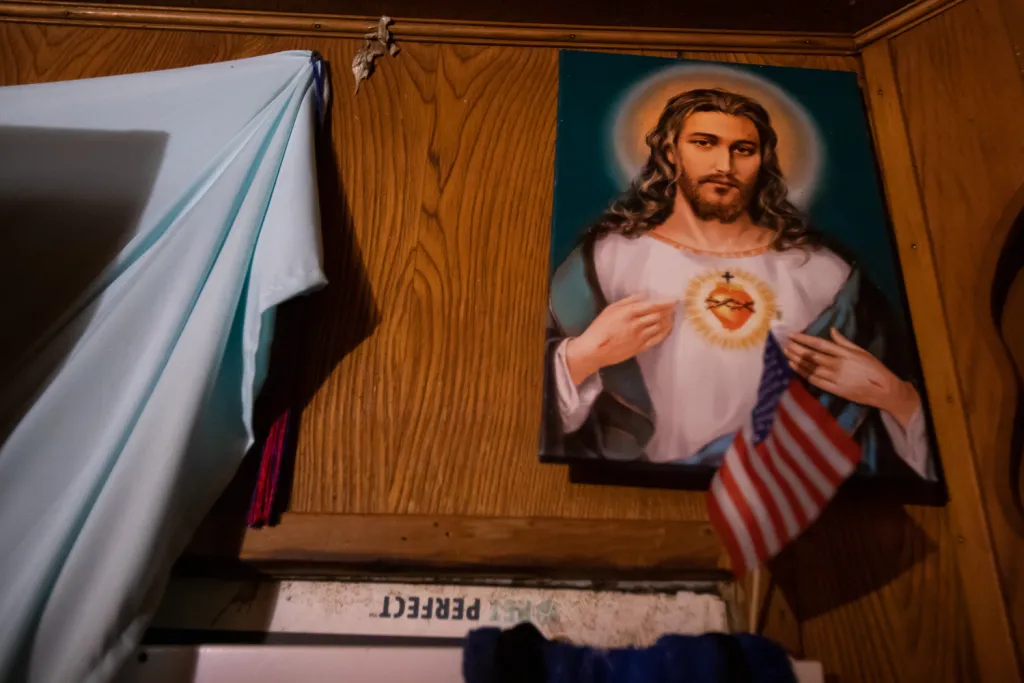
“Nos trataron como unos criminales … Yo lloraba y decía, ‘¿por qué?’ No entiendo porqué nos detienen,” Elizabeth said in Spanish, recounting their arrest. “They treated us like criminals … I cried and asked, ‘Why?’ I don’t understand why we’re being detained.”
Pedro said the agents laughed at them, telling them they were going to send them “back to Mexico.”
They were first taken to a “holding room” in Las Cruces, according to the ICE detainee locator, where they were fingerprinted, photographed and held for about four to five hours, Pedro said. They were given water and a cookie.
Restrained with their ankles in leg cuffs and their wrists shackled to a chain around their waists, they were transported to ICE’s El Paso Processing Center near El Paso International Airport. After waiting in the transport vehicle for more than an hour, agents told them the facility was at capacity and they could not be accepted there, the siblings said.
They were then transported to the Otero County Processing Center in Chaparral, New Mexico – a privately owned detention facility that’s part of the U.S. Department of Homeland Security El Paso Field Office.
Life in ICE detention
Following their Jan. 27 arrest, they faced removal proceedings at the Otero Immigration Court. The proceedings are hearings to determine whether a noncitizen can stay in the United States. An asylum claim can be presented as a defense against removal.
“Nothing has changed to merit detention or the reinstatement of new removal proceedings,” court filings by Wedemeyer seeking his clients’ release said.
Court records state that the siblings had the proper documentation to be in the country and cite that the DHS has twice dismissed removal proceedings – in January and August 2023.
Wedemeyer said his clients have not broken any laws, have held down full-time jobs and attended school. Elizabeth graduated from a Doña Ana County high school, while Pedro is enrolled in an online high school equivalency program offered by the University of New Mexico.
Both work at the flower farm, and Pedro recently received a raise due to his strong work ethic, Wedemeyer said.
Otero Immigration Court Judge Ralph E. Girvin on Feb. 5 approved a joint motion by Wedemeyer and ICE attorneys to administratively close the case, essentially pausing the removal proceedings. The administrative closure does not dismiss their case, Wedemeyer said.
During the hearing, Girvin asked ICE attorney Patricia Llanos if there was a reason for the siblings’ detention. She responded that it was her understanding the encounter was “a result of ongoing enforcement actions.”
In the court filings, Wedemeyer claimed the Department of Homeland Security was “grossly violating” laws that require ICE to make custody decisions within 48 hours of arrest and “eviscerating” the promise made by the U.S. Citizenship and Immigration Services that the siblings could remain in the country until their asylum application is decided.
The documents also state that, at the time of the arrests, Pedro and Elizabeth requested contact with their attorney and were denied access to Wedemeyer.
An agent told Elizabeth “eso no te va a servir para nada,” or “that won’t help you for anything,” according to the court documents. The documents also state that officers “inexplicably arrested and shackled” the siblings without warrants and detained them in the Otero center “under jail-like conditions.”
During the hearing, Girvin made a point to tell Wedemeyer that all detainees “receive very good care, to include meals, shelter.”
About 12 hours had passed since their arrest before the siblings reached the Otero center about 30 miles from El Paso that Monday evening.
Pedro said he then spent about 12 hours in a crowded holding cell, sleeping overnight on a cold floor alongside about 50 other detainees. They were taken to their individual cells and provided bedrolls Tuesday evening, he said.
Elizabeth and Pedro said that the center sometimes was short on food, so some detainees were given hamburger buns without any meat or servings a fraction of the size of what others received.
They said detainees were subjected to verbal abuse by guards.
“Te ofenden, te dicen pendejo, te dicen,‘No estás en tu casa, güey,’” Pedro said. “They offend you, they call you stupid, they tell you, ‘You’re not in your house, idiot.’” Elizabeth added that the women were called puercas and cochinas, or dirty pigs, for so much as leaving a strand of hair in their cells.
Nightmares of Guantánamo
The Otero County Processing Center is the same facility that is holding a group of Venezuelan men who the Trump administration planned to send to Guantánamo Bay because of their purported danger.
The administration opened Guantánamo, the naval base near Cuba, as a detention center “for high-priority criminal aliens unlawfully present in the United States,” according to a Jan. 29 White House memo. A federal district court judge in New Mexico on Feb. 9 issued a temporary restraining order preventing the mens’ transfer.
Pedro said guards and other detainees at the Otero center repeatedly told him to be careful or he might end up at Guantánamo. Among the detainees, Pedro said, were those he believed to be members of the Tren de Aragua Venezuelan gang designated as a foreign terrorist organization by the Trump administration.
“I really thought they might take me (to Guantánamo) because they were saying everyone was being taken there,” Pedro said, adding he had nightmares about being transferred. “I was nervous, afraid, but thank God I’m with my family now.”
Elizabeth said some of the detained women also cried thinking they might be sent to Guantánamo.
She said she mostly cried thinking about not ever again seeing Pedro or her other siblings – or being returned to Honduras. When she called home, she avoided asking about her siblings to avoid an emotional breakdown.
“Me sentaba en la cama y decía, será que no los voy a ver por mucho tiempo, me van a regresar a lo mismo,” she said. “I would sit on the bed and say, I’m not going to see them for a very long time. They’re going to take me back to the same thing.”
“Teníamos un miedo horrible de regresar a lo mismo, de regresar y no saber si la gente mala nos está esperando allá,” she continued. “We were horribly afraid of going back to the same thing, to go back not knowing if the evil people were waiting there for us.”
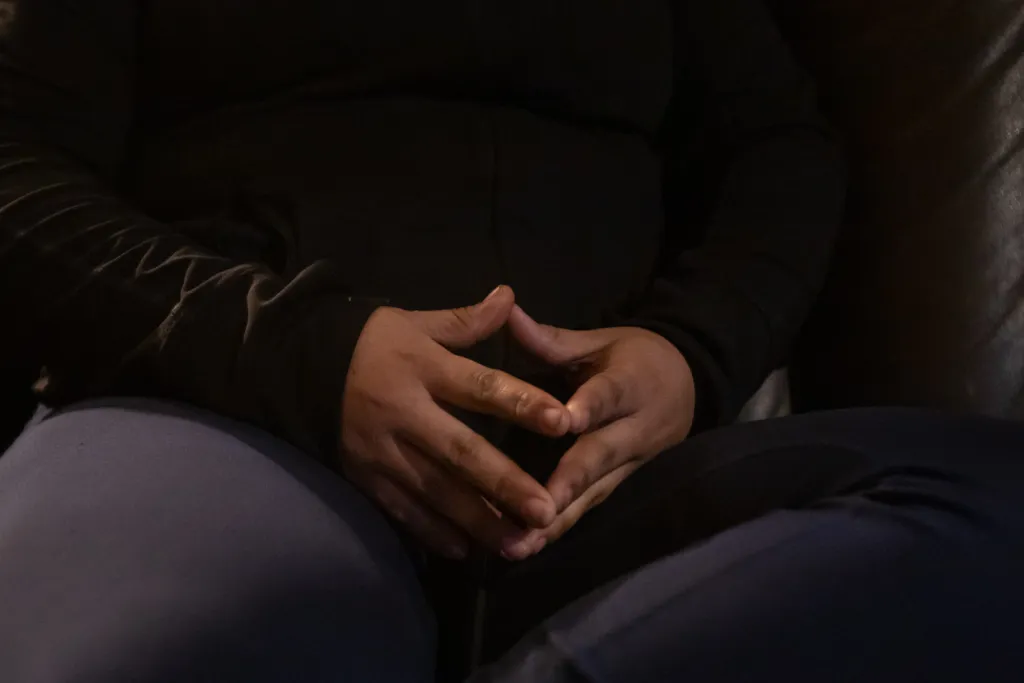
She prayed to be set free.
“Yo me sentaba y decía, ‘Dios mío, ayúdame, sácame de aquí,’” Elizabeth said. “I would sit down and say, ‘My God, help me, get me out of here.”
David Donatti, senior staff attorney with ACLU Texas, said the Trump administration is intentionally instilling fear in people.
“A broad net (of migrant arrests) allows them to inspire fear in all of us — regardless of our status,” he said. “Fear is how the president with the stroke of a pen can say you’re American or you’re not.”
Elizabeth and Pedro said they now live in fear even though they know they have a right to live and work in the country.
“Every time I pass through there, I feel they’re going to get me, that they’re going to stop me for no reason and take me away,” Pedro said.
Elizabeth says she now constantly looks over her shoulder.
“Yo antes no temblaba así, y ahora tiemblo,” she said, holding out her shaking hand. “I didn’t tremble like this before, and now I tremble.”
‘They’re just numbers’
On Feb. 10, five days after their case was administratively closed and two weeks after the siblings were apprehended, ICE agents drove them in “la perrera,” the transport vehicle often referred to as a dog cage, and dropped them off at the entrance of El Paso International Airport.
“In this whole incident, the rule of law was tested,” Wedemeyer said. “In the end, the right thing happened but it’s unfortunate the rule of law takes time.”
Elizabeth said their journey from Honduras was traumatizing enough, and their arrest has only added to that.
Border czar Tom Homan said in an interview with ABC 7 KVIA on Feb. 4 that everybody ICE arrests is “a targeted enforcement operation,” stating that while they might not be doing immigration sweeps, “when we have a public safety threat or national security threat, there’s no safe harbor.”
But Donatti, the ACLU attorney, said stories like that of Pedro and Elizabeth are far too common under the Trump administration’s fundamentally different vision of who belongs in the country.
“What we are seeing is absolutely not targeted against people who are here unauthorized and have committed crimes or are a threat to our safety,” Donatti said. “What we are seeing is an effort to rewrite what it means to be an American and rewrite who can be expelled from the country at any given moment.”
Donatti cited news reports of arrest quotas, saying they only pressure law enforcement to arrest immigrants who have not committed crimes – and stop people indiscriminately to question their status. The Washington Post reported in late January that the Trump administration set a quota for ICE that the agency make 1,200 to 1,500 arrests per day.
Donatti said the quotas appear to be arbitrary and are nothing more than “a desire to run up the score,” adding that having high arrest numbers allow law enforcement officials to pat themselves on the back and say, “We’ve done a good job for our leader.”
The message to agents on the ground is that their job is solely to detect people and apprehend them, he said.
“And that’s why they’re going to pull over vehicles and they’re going to question all of the occupants, and they’re going to arrest people on questionable judgment – whether there’s a basis for arrest at all,” Donatti said.
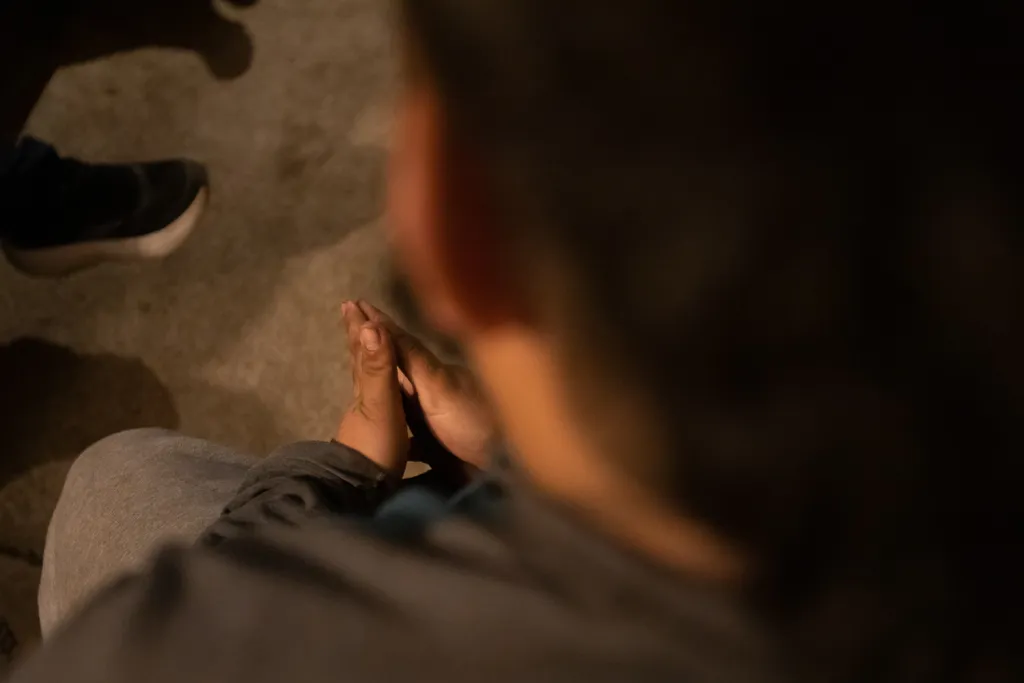
The quotas follow a DHS directive authorizing a slew of law enforcement agencies to “apprehend illegal aliens,” including the U.S. Marshals, Drug Enforcement Administration, the Bureau of Alcohol, Tobacco, Firearms and Explosives, and the Federal Bureau of Prisons. ICE’s Homeland Security Investigations division also was instructed to shift its focus from counterterrorism and other international crimes to immigration enforcement.
Donatti said all of this leads to cases – people – no longer being considered on an individual basis.
“We’ve seen a dramatic increase in what they call collateral arrests,” he said. “You pursue someone with a criminal record, or not, then you ask everybody in the vicinity about their status. … When you’re trying to get a number of arrestees, you’re not looking at who you’re arresting. They’re just numbers.”
Long journey to their new home
The siblings describe their detention as disturbing – leaving them with a sense of fear and insecurity in the country they traveled more than 2,200 dangerous miles to reach.
Their father left Honduras to come to the United States years earlier. Elizabeth and Pedro stayed behind with their grandparents in Tegucigalpa, the capital of Honduras. At 12 and 13 years old, they said, they were assaulted and threatened at gunpoint by gangs trying to recruit them to sell drugs at their neighborhood and school.
With their family’s blessing, they said, they joined a group of Hondurans who were journeying to the U.S.-Mexico border.
Pedro and Elizabeth recounted walking and taking buses from Honduras to Guatemala, about 250 miles, over several days.
“People would say, ‘But you’re so young.’ And we would say, ‘Well, it’s out of necessity, we have to keep going,” Elizabeth said.
They survived countless days filled with fear not knowing what they’d do next, and many nights praying in tears.
“Mi hermano siempre ha sido el más fuerte,” Elizabeth said. “El me apoya, me dice, ‘Todo va estar bien, no te preocupes.’”
“My brother has always been the strongest,” Elizabeth said. “He supported me and would tell me, ‘Everything is going to be OK, don’t worry.’”
One of their scariest moments, Pedro recounted, was riding La Bestia, the network of freight trains that countless Central American migrants ride atop to traverse through Mexico. He said he saw some people fall off, lose limbs or die.
“That was very traumatic,” Elizabeth said. “As time went by, we overcame that. Well, not totally overcame it because we talk and it all comes back to mind and we relive it. But we’ve been strong. Everyone tells us we’ve been strong because getting here is no easy task.”
They stayed in Mexico for three months, most of the time in the southern state of Chiapas, and took odd jobs fixing and painting furniture and working in retail stores to save up money to continue their trek northbound.
In 2021, at 14 and 15 years old, the siblings entered the United States and turned themselves in to Border Patrol agents. They were designated as unaccompanied children and spent 20 days in a crowded Border Patrol processing center in El Paso. They were transferred to the Pecos Children’s Center in Pecos, Texas, about 250 miles east. The center was an emergency intake site for unaccompanied migrant children.
Despite being apart from their parents at the time, the siblings recalled the Pecos facility fondly, with Elizabeth saying there they were treated “kindly, humanely, as children.”
“But we were desperate not knowing what was going to happen to us,” she said.
They remained there for three months before being reunified with their father in Las Cruces in June 2021.
They formally applied for asylum in February 2023. With their applications pending, they were allowed to remain in the United States legally to await their immigration hearing, and later received work authorization.
An uncertain future
“They’ve always been close, always looked out for one another. They are also very hardworking, very studious,” their father said. He and his wife have two other children, a 12-year-old daughter and a 3-year-old son, who was born in the United States. The 12-year-old, the father said, often shed tears while her big sister was detained.
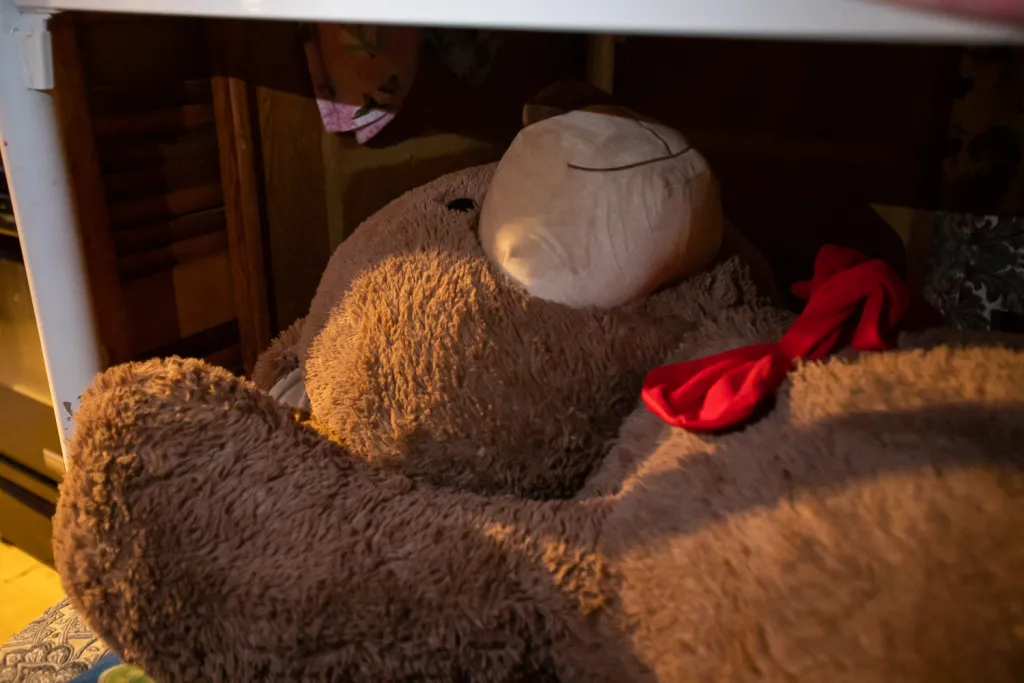
“Como me hace falta mi hermana, mi gordita, la extraño mucho,” the father said she cried when Elizabeth was detained. “How I need my sister, my gordita, I miss her very much.”
While the family remains focused on remaining in the United States, “what ifs” sometimes invade their thoughts.
“We are not focused on deportation, but we know it’s a possibility,” the father said. “What I do know is we can’t return to Honduras. We’d have to consider where to go, what to do and do it together.”
Elizabeth said after all they endured and survived together, her future depends on Pedro’s.
“Yo no me veo una vida sin mi hermano,” she said. “I don’t see a life without my brother.”
“What would I do without my brother? What would be of my family?’ she asks. Feeling torn, she adds, “But I don’t want to take away an opportunity for my (siblings) to be here, to live here. Life is better here.”
This story was originally published by El Paso Matters.